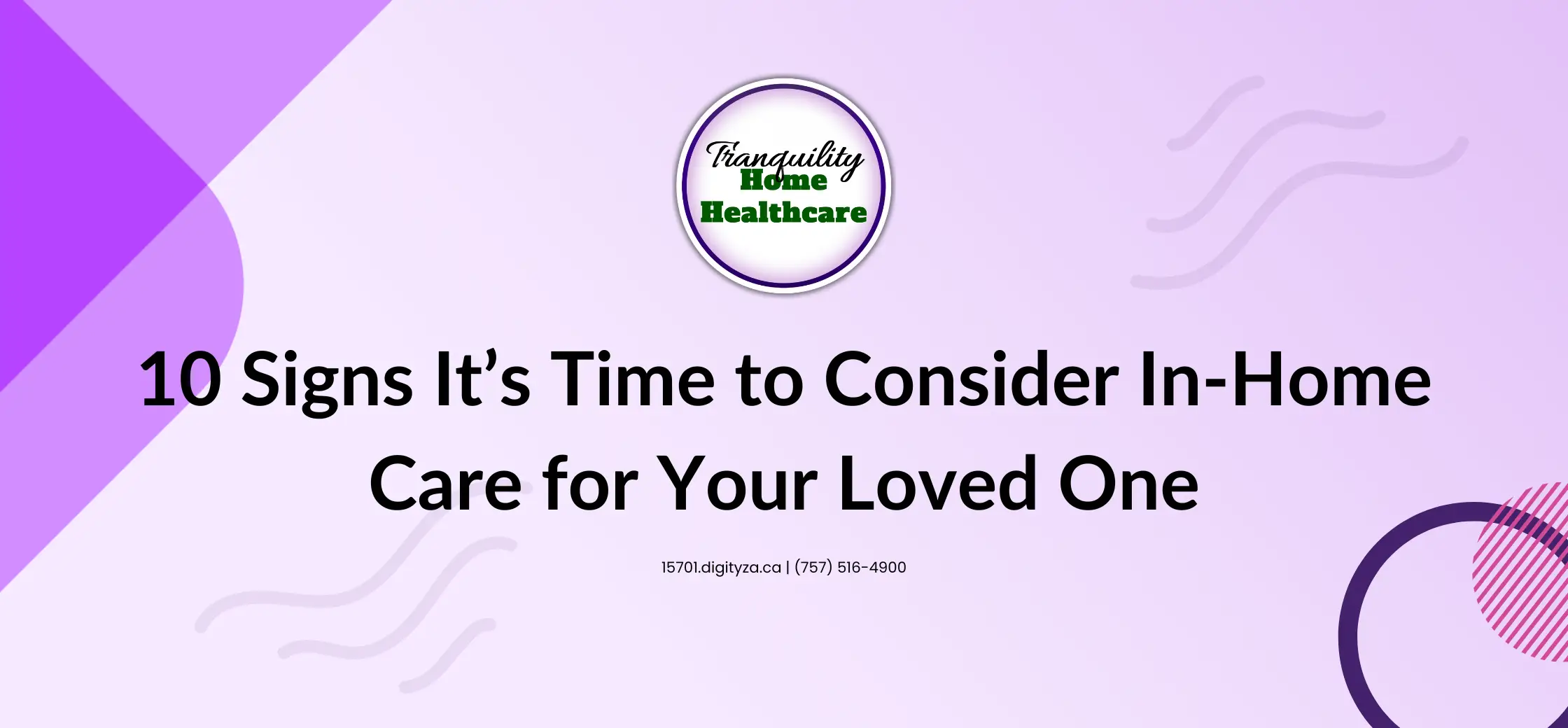10 Signs It’s Time to Consider In-Home Care for Your Loved One
Deciding when to introduce in-home care can be challenging for many families. You want your loved one to maintain their independence, yet safety and well-being are also top priorities. In-home care can provide the necessary support while allowing seniors to age in place comfortably. But how do you know when it’s time to take that step? In this blog, we’ll outline the top 10 signs that indicate your loved one may benefit from in-home care.
1. Difficulty with Daily Tasks
One of the clearest signs that in-home care may be needed is when your loved one struggles with daily tasks. Activities like bathing, dressing, cooking, and cleaning can become overwhelming, posing safety risks.
- Why it Matters: Neglecting daily tasks can lead to hygiene issues, poor nutrition, and an increased risk of accidents.
- How In-Home Care Helps: Caregivers provide assistance with personal care, meal preparation, and light housekeeping, making daily routines manageable and safe. Learn more about personal care services.
2. Frequent Forgetfulness
If your loved one is frequently forgetting important things, such as taking medications, turning off the stove, or keeping appointments, it may be a sign that in-home care is needed. Memory lapses can lead to dangerous situations, especially for seniors living alone.
- Why it Matters: Forgetfulness can compromise safety and well-being.
- How In-Home Care Helps: Caregivers can assist with medication reminders, daily schedules, and safety checks to prevent potential accidents.
3. Changes in Physical Appearance
If you notice changes in your loved one’s appearance, such as weight loss, poor grooming, or wearing inappropriate clothing, it could indicate that they’re struggling with self-care.
- Why it Matters: Poor grooming and sudden weight loss can be signs of declining health or difficulty managing daily routines.
- How In-Home Care Helps: Caregivers offer support with personal hygiene, grooming, and dressing, ensuring that seniors look and feel their best. Explore personal care services here.
4. Mobility Challenges
Mobility issues are common as people age, making it difficult to move around the home safely. If your loved one is struggling to get up from a chair, climb stairs, or walk without assistance, it may be time to consider in-home care.
- Why it Matters: Mobility challenges increase the risk of falls, which can lead to serious injuries.
- How In-Home Care Helps: Caregivers provide mobility support, ensuring your loved one moves safely within their home environment. Learn more about elderly assistance services.
5. Increased Loneliness or Isolation
Seniors who live alone may experience feelings of loneliness or isolation, which can lead to depression and anxiety. If your loved one seems withdrawn or has lost interest in social activities, in-home care may be beneficial.
- Why it Matters: Social isolation can negatively impact mental and physical health.
- How In-Home Care Helps: Caregivers provide companionship, engage in conversations, and encourage social interactions, helping seniors feel connected. Find out more about companionship services.
6. Poor Nutrition or Meal Preparation
If your loved one is neglecting meal preparation, skipping meals, or eating unhealthy foods, it could be a sign that they need additional support. Malnutrition is a serious risk for seniors and can lead to various health problems.
- Why it Matters: Proper nutrition is essential for maintaining strength, energy, and overall health.
- How In-Home Care Helps: Caregivers can prepare balanced meals, ensure proper hydration, and help with grocery shopping. Explore meal preparation services.
7. Increased Frequency of Accidents or Falls
If your loved one has had recent falls, accidents, or close calls, it may be time to consider in-home care. Falls can lead to serious injuries and a loss of confidence, making seniors less active.
- Why it Matters: Preventing falls is critical for maintaining seniors’ independence and health.
- How In-Home Care Helps: Caregivers can assess the home for hazards, provide mobility support, and ensure a safer environment.
8. Neglected Household Responsibilities
If your loved one’s home appears cluttered, dirty, or disorganized, it may indicate that they’re having difficulty keeping up with household chores. This could be due to physical limitations, cognitive decline, or a lack of motivation.
- Why it Matters: A clean and organized home is vital for safety and mental well-being.
- How In-Home Care Helps: Caregivers offer light housekeeping services, helping maintain a clean and safe living environment. Learn more about elderly assistance.
9. Signs of Depression or Anxiety
Seniors may not always express feelings of sadness or worry, but signs like changes in sleeping patterns, loss of appetite, or decreased interest in activities could indicate depression or anxiety.
- Why it Matters: Mental health issues can worsen physical health and decrease quality of life.
- How In-Home Care Helps: Caregivers provide emotional support and encourage participation in hobbies, promoting mental wellness. Explore how companionship services help mental well-being.
10. Declining Health or Medical Needs
If your loved one’s health is declining, they may need help managing medications, attending medical appointments, or recovering from illness or surgery. In-home care offers the medical support needed to address these issues.
- Why it Matters: Managing health needs properly is crucial for improving recovery and overall well-being.
- How In-Home Care Helps: Caregivers offer medication reminders, help with doctor visits, and provide monitoring for chronic conditions. Find out more about in-home care for health needs.
When to Consider In-Home Care
Recognizing the signs that indicate the need for in-home care can be challenging, but it’s a necessary step in ensuring your loved one’s safety and comfort. If your loved one exhibits any of these signs, in-home care could provide the support they need to maintain independence and well-being.
If you’re considering in-home care for a loved one, reach out to Tranquility Home Health Care. Our caregivers offer personalized support tailored to your loved one’s specific needs.
